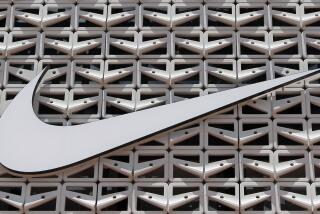PacSun Takes Spill as Other Retailers Shine
- Share via
Retail stocks were lifted Thursday by strong profit reports from Target Corp. and J.C. Penney Co., but Anaheim-based Pacific Sunwear of California Inc. disappointed investors after the bell by slashing earnings expectations for the third quarter.
Pacific Sunwear reported that second-quarter net income fell 54% to $9.7 million, or 14 cents a share, compared with $21.1 million, or 28 cents, in 2005. Analysts, warned this month that profit was likely to be lower, had expected 15 cents a share. Sales rose 1.5% to $313.7 million. Sales at stores open a year or more fell 5.5%.
The retailer of surf and skate apparel unnerved investors by saying it now expected earnings of 22 cents to 30 cents a share for the current quarter -- far below the 49 cents that analysts had been expecting. Shares plunged to $14.40 after hours; they had gained 15 cents to $15.15 in regular trading.
“I am obviously very disappointed with our second-quarter results,” Chief Executive Seth Johnson said in a statement.
He said that back-to-school sales had gotten off to a slow start and that it wasn’t immediately clear why the company’s products weren’t selling well.
Pacific Sunwear has seen its stock sink nearly 40% this year amid fierce competition from more mainstream retailers, such as Aeropostale Inc. and American Eagle Outfitters Inc. Edgier foes such as Zumiez Inc. have also cut into PacSun’s market share, winning over some surfers and skateboarders who consider its products to be the most “core.”
PacSun operates 1,129 PacSun and d.e.m.o stores around the country.
The earnings picture was considerably brighter for some of the nation’s major retailers, which beat profit expectations despite the toll taken by climbing gasoline prices.
Target reported that profit jumped 13% to $609 million, or 70 cents a share, a penny more than analysts had been expecting. That compared with $540 million, or 61 cents, in the same period last year. Sales rose 11.3% to $13.3 billion.
“We continue to believe Target will deliver strong sales and profit performance in 2006 and generate another year of profitable market share growth, even in light of the challenges posed by the current economic environment,” CEO Bob Ulrich said in a statement.
Shares of the Minneapolis-based discounter jumped $2.44, or 5.4%. to $47.72.
Kohl’s Corp., based in Menomonee Falls, Wis., said after the bell that it earned $232.4 million, or 69 cents a share, in the second quarter, up from $187.2 million, or 54 cents, a year earlier.
Its shares, which closed up 64 cents to $58.19, shot up to $60.45 in after-hours trading.
“We continue to see consistency in all lines of business and all regions of the country,” Kohl’s CEO Larry Montgomery said in a statement, as the company boosted profit expectations for the year.
J.C. Penney’s profit rose 37% to $179 million, or 76 cents a share, compared with $131 million, or 50 cents, a year earlier. The department-store chain’s shares rose $1.58 to $65.58.
Second-quarter earnings have been strong for many large retailers this year compared with 2005, said David Dropsey, a research analyst with Thomson Financial.
As a group, large specialty stores have posted a 32% jump in earnings over last year, he said, while the department-store segment has risen 27% and large electronics retailers have advanced 19%.
“We’re seeing some tremendous earnings growth,” Dropsey said.
Events such as the revelation of a suspected terrorist plot aren’t likely to trip up shoppers, experts say.
“No one really feels any actual association to it unless you know someone involved in it,” Dropsey said. “You’re going to hear this in the news today and tomorrow and people will be out shopping. Life goes on.”
Still, experts say retailers have ample cause for caution, particularly given the weakening housing market, which makes it less likely that consumers can keep using their homes as piggy banks.
“The general environment is one of growth that’s going to be slowing but not stopping,” said Scott Hoyt, an economist with Economy.com. “So it’s going to be a difficult environment for retailers but not an impossible one.”
More to Read
Inside the business of entertainment
The Wide Shot brings you news, analysis and insights on everything from streaming wars to production — and what it all means for the future.
You may occasionally receive promotional content from the Los Angeles Times.










